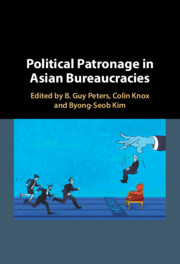Book contents
- Political Patronage in Asian Bureaucracies
- Political Patronage in Asian Bureaucracies
- Copyright page
- Contents
- Figures
- Tables
- Contributors
- Abbreviations
- 1 Patronage in Asian Political Systems
- Part I One-Party Dominated Systems
- Part II Two-Party/Multi-Party Systems
- 5 Patronage Appointment in Japanese Politics
- 6 Patronage in Mongolia
- 7 Loyalty or Expertise? The Practice of Political Patronage in Taiwan
- 8 Political Appointments in South Korea
- 9 Patronage Appointments in the Philippine Public Service
- Part III Autocracies
- Index
- References
7 - Loyalty or Expertise? The Practice of Political Patronage in Taiwan
from Part II - Two-Party/Multi-Party Systems
Published online by Cambridge University Press: 05 October 2023
- Political Patronage in Asian Bureaucracies
- Political Patronage in Asian Bureaucracies
- Copyright page
- Contents
- Figures
- Tables
- Contributors
- Abbreviations
- 1 Patronage in Asian Political Systems
- Part I One-Party Dominated Systems
- Part II Two-Party/Multi-Party Systems
- 5 Patronage Appointment in Japanese Politics
- 6 Patronage in Mongolia
- 7 Loyalty or Expertise? The Practice of Political Patronage in Taiwan
- 8 Political Appointments in South Korea
- 9 Patronage Appointments in the Philippine Public Service
- Part III Autocracies
- Index
- References
Summary
This chapter uses Taiwan’s case to address the following questions: What context constitutes the practice of patronage in Taiwan? What are the strategies for patronage appointments? With literature review, secondary resources, and in-depth interview data, the authors indicate that Taiwans patronage appointments are highly tangled with the history of democratization and a solid civil service system. Therefore, the elements of loyalty and expertise coexist in the practice of Taiwans patronage appointments. In addition, the authors also embed Taiwans case into the unified framework of patronage appointments, analyzing the observed types of patronage and potential explanatory factors. This chapter could provide useful insights for further comparative research when it comes to exploring the differences and similarities between Asian countries political patronage issues.
- Type
- Chapter
- Information
- Political Patronage in Asian Bureaucracies , pp. 154 - 182Publisher: Cambridge University PressPrint publication year: 2023

